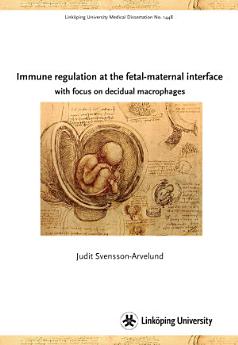Immune regulation at the fetal?maternal interface with focus on decidual macrophages
Judit Svensson?Arvelund
Apr 2015 · Linköping University Electronic Press
5.0star
1 reviewreport
Ebook
150
Pages
reportRatings and reviews aren’t verified Learn More
About this ebook
A successful pregnancy requires that the maternal immune system adapts to tolerate the semi-allogeneic fetal-placental unit. This adaptation mainly occurs locally, i.e. at the fetal-maternal interface, where fetal-derived tissues come into close contact with maternal cells in the uterine endometrium (called decidua during pregnancy). Macrophages and regulatory T (Treg) cells are maternal immune cells that are enriched in the decidua and they likely play a central role in promoting fetal tolerance. However, the precise function of decidual macrophages and the factors regulating both macrophages and Treg cells in humans are unknown. The aim of this thesis was to characterize the phenotype and function of decidual macrophages from first trimester human pregnancy and to identify factors responsible for inducing tolerogenic properties in both decidual macrophages and Treg cells. CD14+ decidual macrophages showed characteristics of immune suppressive or homeostatic macrophages (expression of CD163, CD206 and CD209), mainly produced immunosuppressive cytokines, like IL-10 and IL-35, while levels of inflammatory cytokines, for instance IL-12 and IL-23, were low. Decidual macrophages also induced the expansion of CD25highFoxp3+ Treg cells, but not of Th1, Th2 and Th17 cells, in vitro. In addition, decidual macrophages preferentially secreted the monocyte- and Treg cell-associated chemokines CCL2 and CCL18, while Th1-, Th2- and Th17-related chemokines were produced at low levels. These results suggest that decidual macrophages contribute to create the unique decidual cell composition and a tolerogenic immune environment that is compatible with fetal development. Further, by comparing decidual macrophages with different in vitro macrophage subsets, we showed that M-CSF and IL-10, but not GM-CSF, Th1 or Th2 stimuli, induced macrophages that resemble decidual macrophages in terms of cell surface marker expression, cytokine andchemokine production and gene expression profile. First trimester placental tissue, in particular placental trophoblast cells, was identified as an important source of M-CSF and IL-10. We also demonstrated that human fetal-derived placental tissue can induce the characteristics of decidual macrophages (CD163+CD206+CD209+IL-10+CCL18+) and the selective expansion of functionally suppressive CD25highFoxp3+ Treg cells, the latter partly mediated through IL-10, TGF-? and TRAIL. The placenta also limited activation of Th cells, for instance by generally reduced cytokine production. Our data show that the placenta has a unique ability to induce tolerogenic immune cells with a reduced inflammatory potential, which is essential for maintaining tissue integrity and preventing inflammation-induced fetal loss.
Ratings and reviews
5.0
1 review
Rate this ebook
Tell us what you think.
Reading information
Smartphones and tablets
Install the Google Play Books app for Android and iPad/iPhone. It syncs automatically with your account and allows you to read online or offline wherever you are.
Laptops and computers
You can listen to audiobooks purchased on Google Play using your computer's web browser.
eReaders and other devices
To read on e-ink devices like Kobo eReaders, you'll need to download a file and transfer it to your device. Follow the detailed Help Center instructions to transfer the files to supported eReaders.




